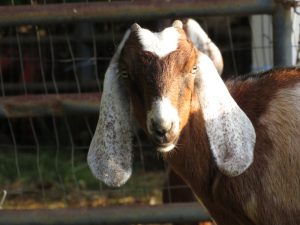Small Ruminant Parasite Management and FAMACHA Certification
 Producers of small ruminants (i.e., sheep, goats, llamas, and alpacas) are invited to attend these workshops to learn about common parasites and their management. Additionally, equine owners may find some benefit from lectures and activities as the themes around parasite resistance and pasture management applies to horses, mules, and donkeys.
Producers of small ruminants (i.e., sheep, goats, llamas, and alpacas) are invited to attend these workshops to learn about common parasites and their management. Additionally, equine owners may find some benefit from lectures and activities as the themes around parasite resistance and pasture management applies to horses, mules, and donkeys.
Hands-on activities, such as performing a fecal egg count on a microscope and practicing the FAMACHA protocol (for barber pole worm) on live animals, will teach producers how to identify parasites to make informed management decisions. Farmers are encouraged to bring a fresh fecal sample from one animal to examine. Participants will become FAMACHA certified and can purchase an anemia index card at the workshop upon certification. Light refreshments will be provided.
Cost: Sliding scale from $50-$80.
Locations and Times
November 17, 2024
9:00 a.m.-1:30 p.m.
Wolfe’s Neck Center, 184 Burnett Road, Freeport, Maine.
Maximum number of participants: 26.
November 24, 2024
9:00 a.m.-1:30 p.m.
Hancock County Extension Office, 63 Boggy Brook Road, Ellsworth, Maine.
Maximum number of participants: 26.
April 19th, 2025
12:00 p.m.-4:30 p.m.
Foxcroft Veterinary Services,1441 Dexter Road, Dover-Foxcroft, Maine.
Maximum number of participants: 15.
April 26, 2025
12:00 p.m.-4:30 p.m.
UMaine Machias, 116 Obrien Avenue, Machias, Maine.
Maximum number of participants: 26.
Agenda
- Welcome and introductions
- Common parasites, Integrated approaches to management and prevention, and intro to FAMACHA
- Protect and prevent animals from pathogens and parasites
- Break with light refreshments
- How to use a microscope and perform fecal egg counts
- Fecal egg count exercise
- FAMACHA practice on live animals
This workshop is part of a series supported by funds from the National Animal Disease Preparedness and Response Program (NADPRP).
Integrated into this series is an invitation to participate further in bolstering your fortress against invading pathogens and parasites. Those who chose to participate will receive, at no cost, in-person support for planning disease prevention on your farm and lab tests on your animals determined by your veterinarian. For more information on this, please contact Carol Delaney, Livestock Specialist, carol.delaney@maine.gov or call 207-215-4968.
If you need a reasonable accommodation, please contact Sue Baez at sue.baez@maine.edu at least one week before the event. If requests are received after this date, we may not have sufficient time to make necessary arrangements.
In complying with the letter and spirit of applicable laws and pursuing its own goals of diversity, the University of Maine System does not discriminate on the grounds of race, color, religion, sex, sexual orientation, transgender status, gender, gender identity or expression, ethnicity, national origin, citizenship status, familial status, ancestry, age, disability physical or mental, genetic information, or veterans or military status in employment, education, and all other programs and activities. The University provides reasonable accommodations to qualified individuals with disabilities upon request. The following person has been designated to handle inquiries regarding non-discrimination policies: Director of Equal Opportunity, 5713 Chadbourne Hall, Room 412, University of Maine, Orono, ME 04469-5713, 207.581.1226, TTY 711 (Maine Relay System).
